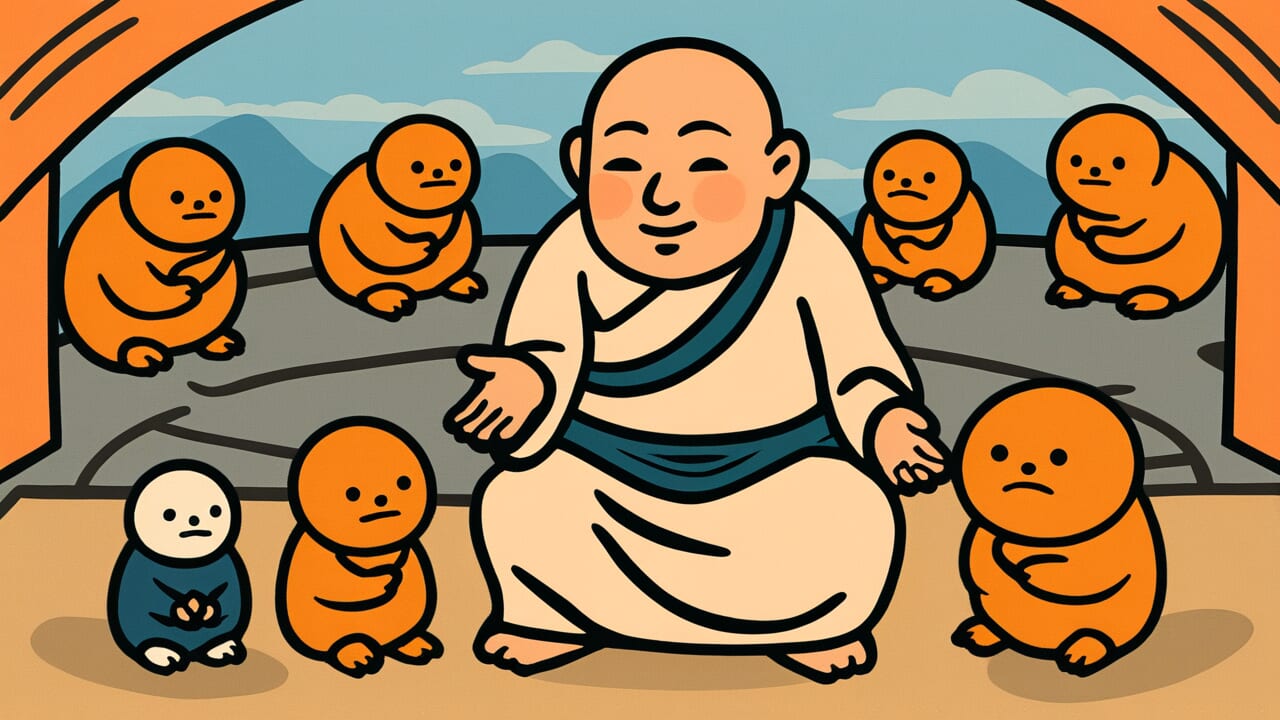How to Read “One young monk and eight tengu”
Kobōzu hitori ni tengu hachinin
Meaning of “One young monk and eight tengu”
“One young monk and eight tengu” is a proverb that describes a situation where one small person faces multiple powerful opponents.
It refers to an overwhelmingly disadvantageous situation. Someone with little power or experience must deal with several opponents who are far superior.
This proverb is mainly used to objectively describe someone in a difficult position. Even one-on-one, the chances of winning are slim.
When facing multiple opponents, the situation becomes even harsher. The expression emphasizes this imbalance of power.
Today, it’s used when an inexperienced newcomer faces multiple veterans. It also describes situations where one person must confront many strong enemies alone.
The extreme contrast between a young monk and tengu vividly conveys the harshness of the weaker party’s position.
Origin and Etymology
No clear written records explain the origin of this proverb. However, we can make interesting observations from the words themselves.
A “young monk” refers to a child who just began training at a temple. In temples, they held the weakest position and had the least experience.
“Tengu” are legendary creatures connected to mountain worship. They have long noses and are said to possess supernatural powers.
In the world of mountain asceticism, tengu symbolized those who had achieved high levels of training.
This contrast likely emerged from the strict hierarchy in Japanese temples and training places. In the world of spiritual practice, the inexperienced received guidance from many seniors and masters.
This structure was common. The number “eight” probably represents “many” rather than a specific count.
Looking at the word structure, we see a clear intention. By contrasting the weakest position with the strongest power, the proverb emphasizes an overwhelming power gap.
Through this extreme contrast, it impressively expresses how difficult it is for one small person to face many powerful opponents.
Usage Examples
- A meeting with one new employee and eight department heads? That’s truly “One young monk and eight tengu.”
- As a beginner joining a team of experienced people, I’m in a state of “One young monk and eight tengu” and feel nothing but anxiety.
Universal Wisdom
The proverb “One young monk and eight tengu” has been passed down because it offers deep insight into power imbalances.
These imbalances have always existed in human society. In every era, weaker people have had to face stronger opponents.
This proverb expresses such situations in a form everyone can immediately understand.
What’s interesting is that this proverb doesn’t just express sympathy for the weak. It also highlights the abnormality of such situations.
The extreme contrast between a young monk and tengu evokes a feeling in listeners. “Isn’t that too unfair?”
Humans instinctively seek fairness. We feel uncomfortable with extreme power differences.
This proverb also expresses the loneliness faced by those in weak positions. In a one-on-one situation, you might ask for help.
But when facing many opponents, a person feels truly isolated. Our ancestors understood the anxiety of those in such situations and preserved it in words.
The psychological pressure from power imbalances is a universal human experience that transcends time.
When AI Hears This
Information theory mathematically proves something important. When the ratio of useful signal to noise drops below a certain threshold, accurate information transmission becomes impossible.
Applying this to “One young monk and eight tengu” reveals a surprising structure.
Consider the young monk as the signal and the tengu as noise. This ratio is 1 to 8, meaning only about 11% is signal.
In communications engineering, information quality drops significantly when the signal-to-noise ratio falls below 50%. This situation is completely at “communication impossible level.”
What’s more interesting is that the tengu aren’t just noise. They’re “false signals.” They don’t emit random noise but continuously broadcast misinformation that looks like correct information.
The most serious problem in this situation is that the learner cannot “distinguish which is the real signal.”
Error detection in information theory requires redundancy. But the tengu emit similar misinformation to each other, so the principle of majority rule works in reverse.
If eight voices agree, the one correct voice gets statistically eliminated as an outlier.
Even in today’s online spaces, people without expertise tend to post with great confidence. Meanwhile, careful statements from real experts get buried.
This is exactly the deterioration of signal-to-noise ratio.
Lessons for Today
This proverb teaches us the importance of recognizing unfair situations. In society, situations where one weak person must face multiple strong opponents exist more often than you’d think.
When you notice such a situation, which side will you stand on?
If you’re in the young monk’s position, don’t try to fight alone. Have the courage to ask for help.
You don’t need to shoulder an overwhelmingly disadvantageous situation by yourself.
On the other hand, if you’re on the tengu side, recognize the unfairness of eight people ganging up on one. When you’re on the stronger side, you have a responsibility to think about how you use your power.
This proverb also teaches us the third-party perspective. When you witness an unfair situation, don’t just look away.
You can become someone who restores balance. By becoming the young monk’s ally, you can become a force that changes the situation.
The desire for fairness is the first step toward creating a better society.



Comments